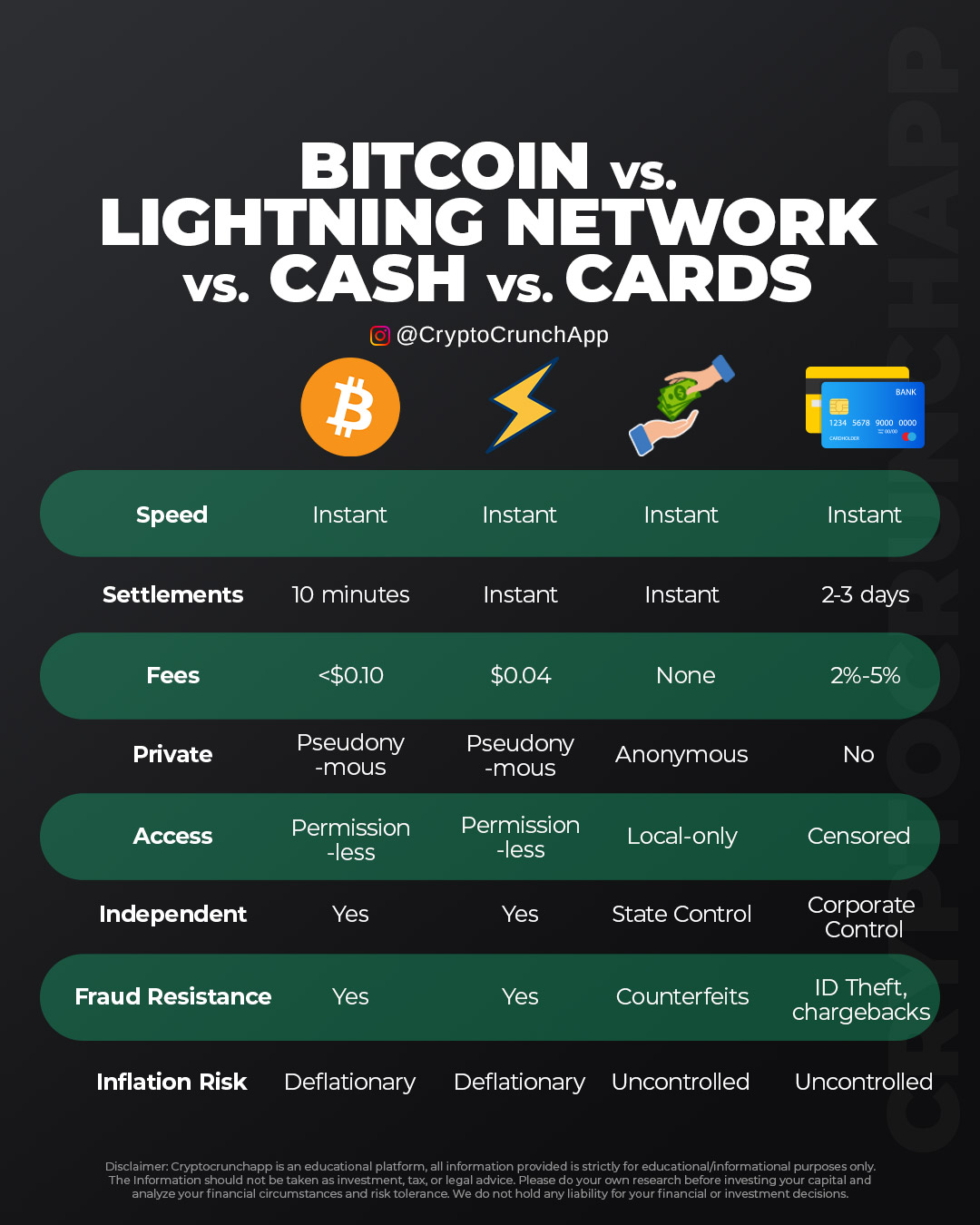8M
...

In today’s fast-paced world, the way we transact financially is at a crossroads of innovation and tradition. Instant gratification is no longer a luxury but a standard in transactions, with various payment methods vying for dominance by offering the quickest tap-and-go solutions. But there’s more to consider beyond just speed when selecting a payment method for both consumers and businesses.
Speed of Transactions
A critical factor in digital payments is the speed at which transactions are processed. Both Bitcoin and the Lightning Network boast instant transaction speeds, reflecting the rapid pace of blockchain technology. Cash transactions, being physical, are also immediate. In contrast, card payments, though electronically processed, can take a few days to settle due to the banking systems involved.
Settlement Times
The settlement time is the period it takes for a transaction to be completely processed and the funds to be available. Bitcoin typically takes about 10 minutes, as it requires multiple confirmations on the blockchain. The Lightning Network is designed for instant settlements, enhancing Bitcoin’s utility for everyday transactions. Cash is inherently instant in terms of settlement, as the exchange of physical notes finalizes the payment. Conversely, card settlements can take 2-3 days, a slower process reflective of traditional banking procedures.
Transaction Fees
Fees are a significant consideration, particularly for small businesses and regular users. Bitcoin’s transaction fees are generally low, typically less than $0.10, while the Lightning Network reduces this further to $0.04. Cash, on the other hand, does not incur transaction fees. Card payments can be costly, with fees ranging from 2-5%, impacting the overall cost of goods and services.
Privacy
In terms of privacy, Bitcoin and the Lightning Network offer pseudonymity, meaning transactions are recorded without revealing the user’s true identity directly. Cash transactions remain anonymous, with no traceability once the cash changes hands. Card payments are not private, as they require personal identification and are traceable through bank statements.
Access
Accessibility to these payment methods varies. Bitcoin and the Lightning Network are permissionless, allowing anyone with internet access to participate without the need for a centralized authority’s approval. Cash is locally accessible and doesn’t require permission, but it’s not suitable for online transactions. Card payments are censored in some regions and require authorization from financial institutions.
Control and Independence
Bitcoin and the Lightning Network are independent of state or corporate control, governed by decentralized protocols. Cash is controlled by state authorities, which can influence its value and use. Cards are under corporate control, with banks and credit card companies having significant power over transactions.
Fraud Resistance and Security
Bitcoin and the Lightning Network transactions are irreversible, providing strong resistance to fraud. Cash has risks of counterfeits, and cards are susceptible to identity theft and chargebacks, presenting security concerns for users.
Inflation Risk
Finally, the inflation risk associated with these payment methods varies. Bitcoin and the Lightning Network are deflationary by design, with a limited supply cap, potentially serving as a hedge against inflation. Cash and card transactions are tied to fiat currencies, which can be inflationary and are controlled by central banks and monetary policy.
In conclusion, the landscape of financial transactions is diverse and complex. Each payment method carries its set of advantages and drawbacks. Whether one prioritizes speed, cost, privacy, or security, the choice becomes a reflection of personal priorities and the context of the transaction. As the economy continues to evolve, so too will our methods of payment, each vying for a place in our wallets and our digital portfolios.













